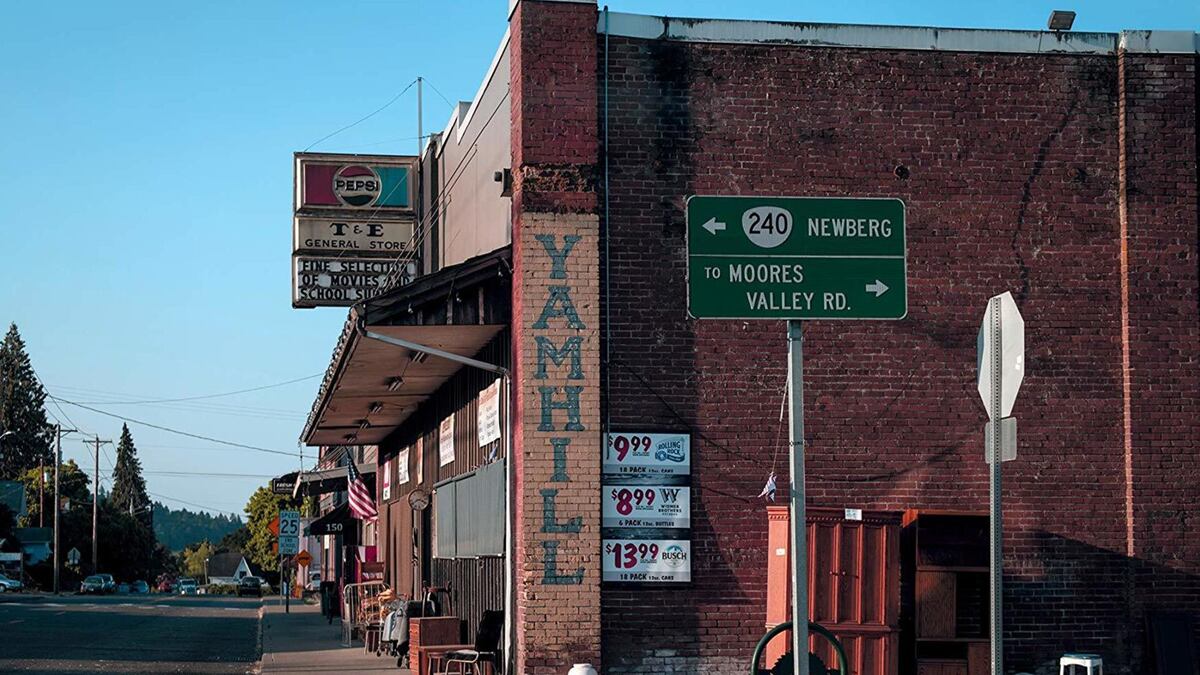This story of seismic collapse begins in Yamhill, Oregon: a town of little more than 1,000 people 40 miles southwest of Portland that was the once-friendly confines where New York Times journalist Nicholas Kristof grew up. He's since witnessed dozens of childhood friends and neighbors succumb to addiction, poverty and a fatal, overriding hopelessness that economists Anne Case and Angus Deaton have termed "deaths of despair."
These intimate losses spurred Kristof and his wife, fellow Pulitzer Prize-winning journalist Sheryl WuDunn, to embark on a book and documentary project, Tightrope: Americans Reaching for Hope, about the systemic failures bleeding places like Yamhill dry. And it doesn't take long for the film to zoom outward from that rural patch of land in the Willamette Valley. In fact, it's not exaggerating to say Tightrope makes the case that the entire country is in decline.
Related: Tightrope Is Painful and Merciless in Its Depiction of a Failed America. It's Also a Must-Read.
"There are real human beings behind these evil forces of drugs and addiction," WuDunn says. "America is only strong if most Americans are strong."
If the news media tend to rely on categorical designations for the country's ills—the housing crisis, the opioid crisis, the unemployment crisis—Tightrope examines their enmeshed totality, everywhere from rural Oregon to urban Baltimore to suburban deserts hiding just off of Southern interstates. The film argues it's past time to untangle the morass, which it pegs as beginning with the War on Drugs and the slashing of social programs in the early 1970s. From there, a spiral of economic and legal policies seemed to specifically attack vulnerable Americans. Wealth failed to trickle down, but trauma did.
Piling on the misery further, the documentary was shot in 2018 and 2019. This year, the "tightrope" has shrunk from razor-thin to immaterial.
"The problems we illuminate are unemployment, addiction, isolation," says Kristof, with a pregnant pause. "Now, we have 11 million fewer people employed than we did before the pandemic. Addiction rates have soared. And people can't get the support they need from institutions or each other."
Tragically, the urgency of those issues repeatedly outpaced Kristof and WuDunn's reporting. Yamhill resident and documentary source Clayton Green died at age 57 during production. Keylan Knapp, the sole survivor of five Oregon siblings whom Kristof knew growing up, died at 54 this spring between the release of the book and the film. Kristof and WuDunn sent money to Knapp's mother for the funeral. What else can you say to someone who lost all five children to drugs, WuDunn wonders.
Related: What Happened to Clayton Green.
Beyond writing about the lives of the people he grew up with, but topically related, Kristof used his platform at The New York Times to voice support for Oregon Measure 110, a ballot initiative to decriminalize drug possession. Although it passed in November, he considers it only a first step.
"I think Oregon is experimenting in exactly the right direction," Kristof says. "What I think is more important is the public health focus rather than the criminal justice focus."
Underscoring its human interest and data-driven reporting, Tightrope also explores how American myths hinder solutions—how detractors of social programs, for example, tend to embrace "rugged individualism" and "personal responsibility narratives." While the film portrays recovering addicts, unhoused grandmothers and adoptive parents gradually accepting community support, it's a thornier question whether working-class whites, in particular, would similarly welcome government assistance.
"This is a demographic that has in many cases been critical of other Americans—particularly people of color—who accepted some kind of assistance," Kristof says. "That can make it particularly painful and humiliating to find oneself in need as well. If we want to acknowledge that problem, as we should, we also have to acknowledge this was preceded by decades and centuries of injustice toward people of color and a complete lack of empathy."
WuDunn adds that blinding partisan narratives are killers of progress in gaining public support for government intervention. On a recent tour of a forest outside Yamhill, Kristof and WuDunn—an eminently friendly couple in their 60s—had the sheriff called on them. Someone had blocked their parked car and reported them as "antifa arsonists."
"They thought we were going to set fire to the forest?" WuDunn says. "Who knows?"
On the cusp of a Biden administration amid the worst days of the pandemic, WuDunn and Kristof say they're ultimately mixed whether the political class will directly assist the nation's most vulnerable. WuDunn is skeptical, bluntly pointing to Senate Majority Leader Mitch McConnell as the staunchest obstacle to expanding critical public health programs. Kristof takes a longer but uncertain view:
"An argument could be made that American history works in long cycles. For 50 years, we've been cutting taxes and underinvesting in human capital. Maybe, maybe that cycle is beginning to turn around."
SEE IT: Tightrope: Americans Reaching for Hope streams on PBS.

